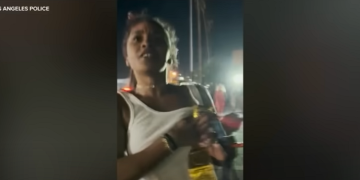The Los Angeles Ethics Commission Tuesday will review the case of former Los Angeles police Sgt. Lewis James Parker III, who is alleged to have violated city law by releasing an audio tape of an encounter he had with a “Django Unchained” actress in 2014 after responding to a report she and her boyfriend were having sex in a car.
The Ethics Commission enforces city laws regarding governmental ethics, conflicts of interests, campaign financing, and lobbying, but has rarely filed a complaint against a police officer. According to Parker’s lawyer, Lawrence Hanna, all previous complaints were for officers who worked in procurement or faced discipline for improper paperwork, but he could find none related to an officer’s actions in the field.
“They have spent $50,000 to $100,000 already on this case in order to collect a $10,000 fine,” Hanna told City News Service. “We had a three-day hearing. I have three boxes of documents on this. This case should have not gone anywhere. What they should be doing is spending $50 to $100 on a medal and have the mayor hang it round his neck and congratulate him.”
Hanna contends that Parker did not violate any city laws or LAPD policies when he released the tape. He also said officers have been using audio recorders in the field for decades, the order that authorized their use does not say the recordings are confidential, and no officer has ever been disciplined previously for releasing audio recordings from the field.
“Why are they going after Parker when chiefs and deputy chiefs in this department have done things and they have not investigated them? That’s the question to ask,” Hanna said. “They have not gone after the brass, but they are going after a sergeant. This is the first case.”
A spokeswoman for the Ethics Commission declined to comment.
The confrontation that led to the leaked audio tape occurred Sept. 11, 2014, when Parker responded to a call about two people having sex in a car parked near Ventura Boulevard and Radford Avenue in Studio City. Parker found Watts and her boyfriend, Brian James Lucas, standing near a car and police said they matched the description of the couple involved.
Police said Watts refused to give Parker any identification and walked away. Two other officers handcuffed her, but she was released after Lucas presented them with her identification. The case received significant media attention after Lucas claimed on Facebook that the officers appeared to believe he and Watts were engaged in prostitution because he is white and she is black. Watts, who had a supporting role in the 2012 film “Django Unchained,” also made claims of racism against the officers involved.
Four days after the incident, according to an Ethics Commission report, Parker released an audio recording of the encounter to the celebrity news website TMZ because he wanted to counter the claims of racism and to defend himself. The report also said that on Sept. 30, 2014, Parker admitted on the record to the LAPD’s Board of Police Commissioners that he provided the audio recording to TMZ and that he knew doing so violated LAPD policy.
Parker said the LAPD opened an internal affairs inquiry into the incident and also ordered him not to speak to the media, but Parker retired in June 2015 before any investigation was completed.
Watts and Lucas eventually pleaded no contest to disturbing the peace and were ordered to write apology letters to the officers and the residents who called the LAPD about their encounter. As part of a deal with prosecutors, charges of lewd conduct were dropped.
In February, the Ethics Commission selected the California Office of Administrative Hearings to serve as the administrative hearing officer in the case, and Administrative Law Judge Samuel Reyes later determined that Parker violated city law but recommended no penalty. However, Ethics Commission staff has recommended that the commission adopt Reyes’ factual findings but impose a penalty of $10,000.
Hanna said the only way for the commission to compel Parker to pay any fine would be to file a civil lawsuit, which would likely cost far more than the potential $10,000 it would be seeking to recover, and if the commission finds there was an ethics violation or levies a fine he is prepared to file a lawsuit in response.






















